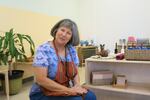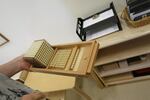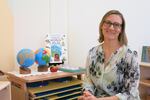One of Oregon's lowest income elementary schools is getting a new preschool Thursday. The free program will start small, but supporters hope it'll slowly transform early education in that part of outer Southeast Portland. The preschool's promise and difficulties reflect issues that the whole state is facing.
Alder Elementary Kindergarten teacher Katie Metko is leading a group of students through a game of "Simon Says," as others wash their hands nearby.

Alder Elementary School teacher Katie Metko follows up a game of "Simon Says" by reading a fable to her kindergarten class.
Rob Manning / OPB
It's kindergarten the way you've always known it. But "Simon Says" is the polar opposite of what's starting down the hall today in Alder Elementary's new preschool program.
Alder Elementary has opened the state's first free public preschool with a Montessori approach to teaching and learning. The lead teacher, Maria Garcia, calls herself a "guide" — not a teacher, because the kids lead the learning at Montessori schools.

Maria Garcia is the "guide," or lead teacher, at the Montessori preschool classroom at Alder Elementary School.
Rob Manning
There's a signature look to a Montessori room. Maps and globes, a garden outside and unique learning materials — like wood blocks and beads to learn math.
"It's not only counting, but squaring or cubing, without the child really knowing what he's doing," Garcia explained, pointing to the corner of the classroom dedicated to math.

Math materials in the Alder Elementary School preschool classroom include beaded objects, often found in Montessori classes.
Rob Manning
Half the room is dedicated to "practical" learning, with little mops, brooms and a miniature kitchen.
Montessori's child-centered approach has long been available to families who can afford to pay the private tuition. But Montessori Northwest is covering the $150,000 cost of the classroom at Alder Elementary — a school where about 90 percent of kids qualify for free lunch.
"This system of education can benefit any child no matter where they come from, because it is based on the human developmental needs," Garcia said.
Leaders at the Reynolds School District, including Alder Elementary principal Rob Stewart, hope the new Montessori program will fill a huge need: providing preschool to 3 -and 4-year-olds.

Alder Elementary School principal Rob Stewart stands in a community garden, outside the Montessori preschool room.
Rob Manning
"We have very few kids — last year, maybe five of the kids out of the 100 kindergarteners that we had, five of them had been to preschool," Stewart called. "Fewer than 10 of them knew letter-sound relationships."
Oregon lawmakers approved $100 million for preschool in the 2015 session, but the money for the Alder Elementary preschool is being provided by Montessori Northwest. Director Jennifer Davidson says their approach is proven to help kids succeed.

Jennifer Davidson directs Montessori Northwest, the non-profit behind the preschool classroom at Alder Elementary School. The Reynolds School District paid to renovate the room, but the non-profit bought materials and is paying the instructional staff.
Rob Manning
"This program in Dallas, Texas, they're in a neighborhood where the average graduation rate is 50 percent. But the children who go through the Montessori program, their high school graduation rate is actually 96 percent," Davidson said.
That's great for the 20 kids who got into the Montessori program at Alder Elementary. But what about the kids who didn't?
"We could only take 20 children, but 78 kids applied," said Laura Bolanos, the family outreach coordinator at Alder Elementary. She works for the non-profit, I Have A Dream Oregon, which is focused on supporting kids through high school and even college completion.

Laura Bolanos coordinates family outreach at Alder Elementary School, as a staff member at I Have A Dream Oregon. She says 78 families were interested in 20 preschool slots at Alder Elementary.
Rob Manning
Standing in the Montessori garden with children playing on the nearby playground, Bolanos remembers looking at the unmet need — even with the new Montessori.
"[I would] see the pile of applications. I was like, 'Oh my God, we need to come up with something,' something that's going to help all these families," Bolanos recalled.
Bolanos is working to connect parents with Montessori strategies. A formal program is planned for a January launch.
The state has a similar outreach effort it's doing, using a smart phone app that parents can download, called "Vroom."

Megan Irwin supervises early learning for the State of Oregon.
Rob Manning
A year from now, the older preschoolers are expected to enter the teacher-led kindergarten classes at Alder. It could be rough.
Megan Irwin would know. She attended a Montessori school through 4th grade, before entering public school.
"It was a funny transition," Irwin said, with a laugh. "I remember we were doing this reading module, I don't remember what the book was, but it was a book, and it had a packet associated with it. And I remember I took it home, read the whole book in an afternoon, and did the whole packet and turned it in, and I got in trouble because it was supposed to take me a month."
Irwin now supervises early learning for the whole state of Oregon, where many children don't attend preschool before entering kindergarten.

Alder Elementary School in the Reynolds School District has a partnership with I Have A Dream Oregon, aimed at getting elementary students planning for college.
Rob Manning
She's on board the state's effort to expand preschool to as many children as possible. But she acknowledges it could raise the bar for the K-12 system.
"That's a question that I'm actually excited that school districts across the state are starting to ask right now, regardless of the preschool model," Irwin said.
The state is spending $16 million dollars on preschool pilots in four regions of Oregon, to see what works. At the same time, officials are confronting the transition issue, by designing an aligned set of standards, starting with 3-year-olds.
So, they're doing some "hands-on" learning themselves.
